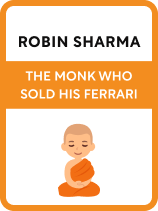

This article is an excerpt from the Shortform book guide to "The Monk Who Sold His Ferrari" by Robin Sharma. Shortform has the world's best summaries and analyses of books you should be reading.
Like this article? Sign up for a free trial here .
Do you need help finding your focus? What is the importance of focus?
In The Monk Who Sold His Ferrari, Robin Sharma shares some principles for better living. One of these is finding your focus, which is critical for happiness.
Keep reading for tips on finding your focus from The Monk Who Sold His Ferrari.
Find Your Happiness by Finding Your Focus
Concentration is the basis of mastering your mind. You must be able to take all of your mind’s power and focus it on a single task. Finding your focus is essential.
Julian illustrates this concept with a riddle: Imagine that you are lost, and freezing cold. You have a pile of kindling, a letter from your best friend, a can of tuna, and a magnifying glass. Unfortunately, you have no matches. How can you start a fire?
The answer is to put the letter among the kindling and focus the sunlight with the magnifying glass. The letter by itself does nothing, but by concentrating the sun’s energy on it, you’re able to create a fire that warms all of its surroundings. The tuna was just a distraction.
Once you understand concentration, you are one step closer to finding happiness and finding your focus. The secret to happiness is to find what you love doing, then concentrate all of your energy on doing it. When you find what you really want to do, your work will seem like play, and will energize you instead of draining you. That’s why finding your focus is critical for happiness.
However, what you do should help others in some way. As Victor Frankl said: Success and happiness can’t be pursued. They come as side effects of dedicating yourself to a greater cause. (Shortform note: For more on creating a meaningful and happy life, read our summary of Frankl’s Man’s Search for Meaning.)
That doesn’t mean you have to quit your job, sell everything you own, and go searching for your passion like Julian did, but try shaking things up. Leave your comfort zone and do something out of the ordinary. Stop being so practical and logical, and try some of the things you’ve always wanted to do.
How to Exercise Your Mind
While listening to Julian, John remembers his youth and wonders when he let go of it. He remembers having huge dreams of being a superstar athlete, or a rich business mogul. He believed that he could do and be anything he wanted. At the same time, his greatest pleasures were simple ones like bike rides and skinny dipping.
John confesses that he has little control over his own thoughts, or life, these days. Julian agrees, and says that he has to work his mind to make it stronger, just like a muscle. You can become better at finding your focus.
John asks for a quick solution, something he can do then and there to fix things. Julian tells him that quick fixes won’t work, but a single month of dedicated effort will be enough to see huge changes in his life. Just ten minutes a day of meditating on his current circumstances, how he’ll make the next day better, and his purpose in life is enough to start. Also, the less he worries about results, the faster he’ll get them.

———End of Preview———
Like what you just read? Read the rest of the world's best book summary and analysis of Robin Sharma's "The Monk Who Sold His Ferrari" at Shortform .
Here's what you'll find in our full The Monk Who Sold His Ferrari summary :
- Why your career success might actually be killing you
- How to live a simple and fulfilling life
- The 10 rituals you should practice for health and healing






